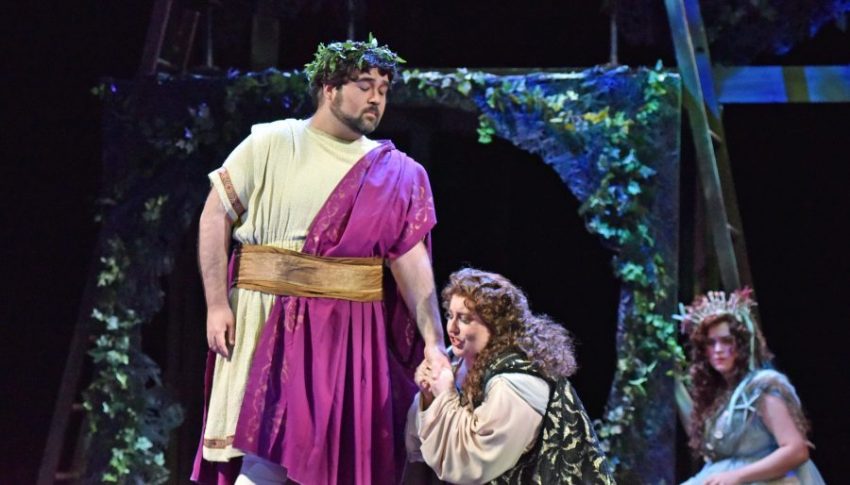
Ariadne auf Naxos. Music by Richard Strauss, libretto by Hugo von Hofmannsthal. Academy of Vocal Arts. February 2018.
Ariadne auf Naxos is a gem of an opera. A flawed gem, to be accurate. It is receiving a polished production at the Academy of Vocal Arts that brings out its sparkle.
The opera’s merits far outweigh its problems; it just misses perfection. I’m a fan of Richard Strauss and Hugo van Hofmannsthal and we must take note of the fact that they were dissatisfied too, and fiddled around with their creation. Their 1912 work was in two parts: first, Molière’s comedy-ballet Le bourgeois gentilhomme with incidental music composed by Strauss, followed by a collision of an opera seria and commedia dell’arte. (Erich Leinsdorf conducted this, with Beverly Sills, in 1969, in which her character sang a longer aria, one key higher than what we now know.)
A 1916 re-write eliminated the Molière and added a conversational prologue which is set in the house of “the richest man in Vienna” where a party is planned. Even the new version has a spotty performance history. Wolfgang Sawallisch loved Strauss and led a concert version of Ariadne auf Naxos with the Philadelphia Orchestra in 1995. Afterwards, management announced that the orchestra would do no more operas. This was perceived as an economic measure that throttled the desires of its conductor. But Sawallisch told me that Ariadne presented so many problems that it overwhelmed him at his age of 72.
To give you an idea of how much Sawallisch adored Strauss, when he was a teenager he borrowed a Strauss score from the public library in his native Munich and never returned it. He said the fine would be tremendous but the library was bombed and destroyed in the war and Sawallisch kept the book. The Academy of Vocal Arts has not performed the opera since its 1992 season. (The Curtis Institute of Music did it in 2015.)
In the story, a serious opera based on Greek mythology is in preparation, and so is entertainment by an Italian commedia dell’arte troupe, followed by fireworks. The host’s major-domo announces that both performances must be combined and end at nine o’clock sharp, which outrages the opera’s composer (Hannah Ludwig, who gives an outstanding interpretation.) Her aria is simultaneously homage to, and a parody of, the lofty ideals of creative artists.
Among the opera’s clever touches is orchestral music that accompanies the major-domo (Roy Wilbur, who also was in the 1992 production.) He’s a pompous character and the orchestra quotes the giants’ music from Wagner’s Ring.
The composer’s opera depicts the mythological Ariadne, abandoned on the Aegean island of Naxos. Zerbinetta and her commedia dell’arte friends try to amuse the mournful woman. Zerbinetta mocks the idea of “languishing in passionate longing and praying for death.” A new lover is her solution. When Ariadne’s nymphs finally announce the arrival of the god Bacchus, Ariadne is transformed by his love.
The biggest flaw in Ariadne auf Naxos is the mock-Wagnerian duet for Ariadne and Bacchus that goes on too long and, furthermore, never reaches the sublime heights that mark the ending of other Strauss operas. The biggest asset is the juxtaposition of dramatic laments by Ariadne with comedic embellishments by Zerbinetta.
The large casting requirements mesh well with the assemblage of resident artists at AVA, and the building where the company performs, an old mansion, is distinctly appropriate. Director Dorothy Danner provides amusing touches and keeps party-goers visible throughout the serious performance, which reinforces the premise that this is a show-within-a-show, a bit like Kiss Me Kate. Val Starr’s costumes are hilariously creative.
Claire de Monteil, the French soprano who is in her first year at AVA, is excellent in the soaring passages of her role. The depths in her character’s personality and vocal range will, presumably, come later. John Matthew Myers is superb in the challenging role of Bacchus. His warm voice has gained considerable power and ring since we first saw him perform with Daniel Pantano’s Concert Operetta Theater in 2013. Credit must include his vocal teacher Bill Schuman, who also coaches some of the world’s best singers, including Angela Meade.
Alexandra Nowakowski is delightful as the salacious Zerbinetta, tossing off her high E’s and her trills with aplomb. Daniel Gallegos is funny as Harlekin, and the three Nymphs are beautifully portrayed by Meryl Dominguez, Alexandra Razskazoff and Gabriela Flores.
Conductor David Aronson makes his Philadelphia debut after two decades of experience in Vienna, where I saw him conduct in 2005, although he led much more Johann Strauss than Richard Strauss there. He brought out rich sounds from the orchestra, and emphasized the waltz passages and playful elements, thus reminding us that Ariadne auf Naxos comes closer to musical comedy than any other Richard Strauss composition.